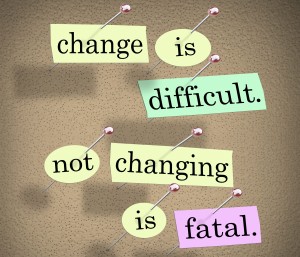Your #Career : How to Successfully #ChangeCareers ……Change is Never Easy, Particularly if you are Trying to Move into an Entirely New Field. But #Change isn’t Impossible. You can Successfully Transition into a #NewCareer, Granted you are Committed to It.
Change is never easy, particularly if you are trying to move into an entirely new field. But change isn’t impossible. You can successfully transition into a new career, granted you are committed to it.
“It is possible to transition into a new job but it takes time and work,” says Catherine Palmiere, president of Adam Personnel, Inc. “Sometimes people make a jump and they haven’t done their due diligence.”
Change never happens overnight, and that is especially true of career change. You can’t wake up one day and say you want to trade your accounting job for a position as a fitness trainer and think it will happen quickly. Not only do you need to research the profession you are aspiring to but you have to see what type of education or certificates are needed.
But even doing that isn’t enough. You also have to look inward and make sure you have the skills and personality needed to make the move successfully. “Someone with great computer skills that’s in the financial service business that wants to move to the cloud platform will have a much easier transition then a financial services worker that wants to be a social worker,” says Palmiere.
Like this Article ? Share It ! You now can easily enjoy/follow/share Today our Award Winning Articles/Blogs with Now Over 2.5 Million Growing Participates Worldwide in our various Social Media formats below:
FSC LinkedIn Network: www.linkedin.com/in/fscnetwork
Facebook: http://www.facebook.com/pages/First-Sun-Consulting-LLC-Outplacement-Services/213542315355343?sk=wall
Google+: https://plus.google.com/115673713231115398101/posts?hl=en
Twitter: Follow us @ firstsunllc
Question: Want the ‘the best/current articles/blogs on the web’ on Job Search, Resume, Advancing/Changing your Career, or simply Managing People?
Answer: Simply go to our FSC Career Blog below & type(#career, #leadership, #life) in Blog Search: https://www.firstsun.com/fsc-career-blog/
What Skill Sets do You have to be ‘Sharpened’ ?
Continue of article:
According to Mary Foley, Senior Sourcing Specialist for IT Talent at Progressive, people looking to switch careers should consider their passions and interests outside the office and think about ways to apply that to a new career. While you may know exactly what you want to do in your new career, for those that want to switch but aren’t sure into what it pays to take one of the many skill assessment tests available over the Web or rely on a self-assessment to figure out where your are strong and what areas you are weak in. After all, if you are not a people person than it’s doubtful that you will succeed in a customer servicerole.
“The key to remember when it comes to career transitions to make one very small step at a time,” says Alexandra Levit, business and workplace consultant and Career Advisory Board member. “Do a lot of investigation behind the scenes but don’t quit your day job.”
Levit says a great way to kick the tires and make contacts is to find a mentor or mentors in the field or job you want to work in. Those people are in the trenches day in and day out and will be a plethora of information about what it’s really like. Finding mentors can be easily done thanks to the Internet. Levit says to use online tools like LinkedIn to zero-in on the people you would want to meet in the field you are eyeing.
Once you have a list of targets, ask them if they have time for a ten or 15-minute informational interview. If you get the interview, you’ll be able to pick their brain and forge a relationship with the person or people. That could translate into a job down the road if you are front and center in their mind when an opening comes up.
Can’t or won’t find a mentor, then consider volunteering. If you always dreamed of working in a museum but ended up in the back office of a financial firm then volunteer at one. According to Levit not many people think of volunteering not only as a way to learn about a job but to get their feet wet and adds skills to their resume.
Once you’ve amassed the necessary skills and have the network in place it’s time to start sending out resumes. While a career transition can be handled in different ways via the resume, career experts say you want to focus on your transferable skills and less about the chronological order of your previous positions.
One way to do that is to go with a functional resume that lists all your skills at the top and then at the bottom has your past jobs in chronological order. “Functional resumes are controversial because people will think you are trying to hide something,” says Levit. “As long as you show your career trajectory at some point the functional resume could cause them to take a second look instead of tossing it in the garbage.”
The last thing you want to do is randomly send out resumes and hope you will get a call back. Instead, Palmiere says you have brand yourself by reaching out to the decision makers. That could mean sending a letter or email to the top person in the company you want to work for and bypassing the HR department altogether.
If you do decide to send a letter or email make sure to research the company and the person you are reaching out to. You want to show that you’ve done your homework and have real reasons to want to work there whether it’s because you believe in the company’s mission or the CEO’s philanthropic work has had such an impact on you.
Glassdoor.com |









